2016高考英语语法复习之旅-动词
高考英语语法填空动词形式练习题30题

高考英语语法填空动词形式练习题30题1<背景文章>Dr. Smith is a renowned scientist who has dedicated his life to researching a new type of material. His journey began when he stumbled upon an interesting phenomenon in his laboratory. Intrigued by what he saw, he decided to embark on a long and arduous research project.He spent countless hours in the lab, conducting experiments and analyzing data. The process was not easy. He faced many challenges along the way. One of the main difficulties was finding the right combination of elements to create the new material. He tried various combinations, but none seemed to work.However, Dr. Smith did not give up. He continued to persevere and eventually made a breakthrough. After months of hard work, he discovered a unique combination of elements that showed great promise. This led to the creation of the new material, which had remarkable properties.The new material was stronger than steel, yet lighter than aluminum. It also had excellent heat resistance and could withstand extreme temperatures. Dr. Smith's discovery has the potential to revolutionize many industries, from aerospace to construction.1. What was Dr. Smith's initial inspiration for his research?A. A book he read.B. An accident in the lab.C. A conversation with a colleague.D. A news article.答案:B。
高中英语语法分类总结--动词及动词短语

pay
attentionBto our table manners. (05江苏卷)
A. demanded B. reminded C. allowed D. hoped 3. --- Ow! I’ve burnt myself! — How did you do that?
④问句形式:
一般问句:Is/Was it + 被强调部 分
+ that + ----
Is it the dictionary that you are looking for?
Was it yesterday that he was fired?
特殊问句:疑问词+is/was +it +that +-----
B.referring to
C.looking for
D.trying on
2、What shall we use for power when all the oil in the
world A
has ______? (05山东卷)
第一A.题gi只ve需n o要ut正B确. 理pu解t o句ut意C就. h不el难d u发p现答D案. 。use第d 二up题
主 一致 谓语 语
① 主谓一致:被强调部分作主语 时,其形式与谓语动词在人称和数 上保持一致。
It is Mary who oftehne_lp___ (help/helps) me witsh my English.
It is I that a_m___ (be) against you.
英语总复习之语法专项讲解8-谓语动词
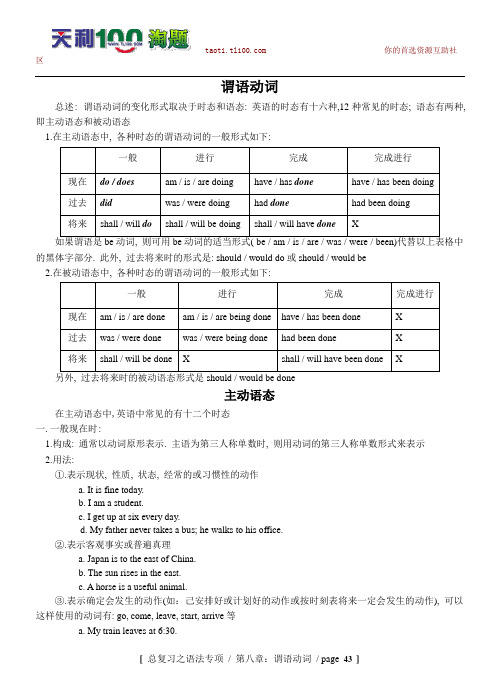
谓语动词总述:谓语动词的变化形式取决于时态和语态: 英语的时态有十六种,12种常见的时态; 语态有两种, 即主动语态和被动语态1.在主动语态中, 各种时态的谓语动词的一般形式如下:的黑体字部分. 此外, 过去将来时的形式是: should / would do或should / would be2.在被动语态中, 各种时态的谓语动词的一般形式如下:主动语态在主动语态中,英语中常见的有十二个时态一.一般现在时:1.构成: 通常以动词原形表示. 主语为第三人称单数时, 则用动词的第三人称单数形式来表示2.用法:①.表示现状, 性质, 状态, 经常的或习惯性的动作a. It is fine today.b. I am a student.c. I get up at six every day.d. My father never takes a bus; he walks to his office.②.表示客观事实或普遍真理a. Japan is to the east of China.b. The sun rises in the east.c. A horse is a useful animal.③.表示确定会发生的动作(如:己安排好或计划好的动作或按时刻表将来一定会发生的动作), 可以这样使用的动词有: go, come, leave, start, arrive等a. My train leaves at 6:30.b. The football match is played the day after tomorrow.④.在时间和条件状语从句中可用一般现在时动词代替一般将来时动词a. I will let you know as soon as I hear from him.b. We will go if it is fine tomorrow.c. I will be away when he arrives.d. We shall not begin the discussion until he arrives.e. Mother, I won’t go out unless you agree.f. Don’t try to run before you begin to walk.⑤.在某些以here / there开头的句子中用一般现在时动词表示现在正在发生的动作a. Here comes the bus.=The bus is coming.b. There goes the bell.二.现在进行时:1.构成: am / is / are doing2.用法:①.表示说话时正在进行着的动作, 或现阶段正在进行而说话时不一定正在进行的动作a. I am writing a letter.b. My mother is making a dress these few days.②.表示即将发生的动作(如:在最近按计划或安排好要进行的动作), 常见的有这种用法的动词有: come /go / leave / start / arrive等, 常与表示将来时间的状语连用a. They are going to Shanghai on Friday.b. John is coming here next week.③.现在进行时动词与always, continually, constantly等连用, 表示反复出现的或习惯性的动作a. The little boy is always asking questions.b. You are always saying that sort of thing.④不表示持续的行为, 而表示知觉, 感觉, 看法, 认识, 感情, 愿望或某种状态的动词通常不用现在进行时, 如: see, hear, smell, taste, recognize, notice, forget, remember, understand, know, believe, suppose, mean, think, love, hate, care, like, dislike, worry, forgive, want, wish, hope, refuse, feel like, belong to , possess, own, have, be, seem等三.现在完成时:1.构成: have / has done2.用法:①.表示动作在说话之前己经完成, 而后果或影响至今仍存在a. He has gone to Shanghai. ( =He went to Shanghai and he is not here now. )b. I have opened the window. ( =I opened the window and the window is now open.)c. The concert has started. ( =The concert started and is now going on. )d. I have had breakfast. (=I had breakfast and I am not hungry now. )②.表示开始于过去, 持续到现在(也许还会继续进行下去)的动作或状态, 用于延续性动词, 且句中常带有表示段时间的时间状语a. I have studied English since 1987.b. He has lived here for two years.c. He has been ill for ten days.3.现在完成时与一般过去时的区别:①.现在完成时和一般过去时所表示的动作都发生在过去, 但前者将过去的动作与现在的结果或对现在的影响联系起来, 而后者只限于表示过去的动作本身, 与现在无关②.现在完成时不能与表明确时间的状语如: yesterday, last year, two days ago, when I came in等连用, 但可与表示不明确时间的状语如: already, yet, sometimes, often, before, lately, recently, once, twice, ever等连用, 也可以和包括现在在内的时间状语如: this morning, today, this week, this year等连用a. She has already come.b. I have met him before.c. Ma Hong has always been a good student.d. Have you ever been to the Great Wall ?e. I have seen him this morning.四.现在完成进行时:1.构成: have / has been doing2.特征: 现在完成进行时兼有现在完成时和现在进行时两者的特点①.它具有现在完成时的特点, 即表示动作发生在过去, 延续到现在或对现在产生影响②.它具有现在进行时的特点, 即可以表示此动作仍在进行或还会继续a. Mr. Smith has taught English for twenty years. ( 至今为止教过二十年英语, 至于teach是否结束或是否延续, 不得而知)b. Mr. Smith has been teaching English for twenty years.( 现在仍在教英语,而且将持续下去)3.用法:①.表示现在之前的一段时间里一直进行的动作, 此动可能仍在进行, 也可能刚刚停止a. I have been reading the book all the morning.b. He has been staying here for two hours.c. I have been living in Beijing since 1972.②.表示现在之前的一段时间里一再重复的动作a. I have been calling you several times in the past two days.4.现在完成时与现在完成进行时的区别: 前者着重表示过去动作对现在的影响或结果; 后者着重表示过去动作的持续进行a. I have written six letters since I got back.我己经写了六封信(强调结果)b. I have been writing letter since I got back. 我回家后一直在写信(强调“一直在写”)c. I have read this book.我读过这本书了(强调“读过”这一结果)d. I have been reading this book.我一直在读这本书(强调“一直在读”)五.一般过去时:1.构成: 用动词的过去式表示2.用法:①.表示过去某一时刻或某一段时间内发生的动作或情况, 其中包括习惯性动作a. I met him yesterday.b. I used to go to school early every morning.c. He entered the classroom, sat down at his desk and began to work.d. Last night, I listened to the radio for two hours and went to bed at midnight.②.在时间, 条件状语从句中用一般过去时代替过去将来时a. Helen had left her keys in the office so she had to wait until her husband came home.③.用一般过去时的句子一般有过去的时间状语, 有时也用地点状语暗示动作的发生是在过去a. Have you seen a pen ? I left it here this morning.六.过去进行时:1.构成: was / were doing2.用法:①.表示过去某一时刻正在进行或一段时间内一直在进行的动作或情况a. This time yesterday we were having an important meeting.b. A year ago we were living in Shanghai.②.过去进行时常与always, continually, frequently等词连用, 表示过去经常发生或反复发生的情况a. The old man was always losing his way.b. The two brothers were frequently quarrelling.③.表示过去将要发生的动作, 这一用法仅限于一些表示位置转移的动词, 如: go, come, start, stay, leave等④.过去进行时经常与一般过去时配合使用, 过去进行时表示过去的时间背景a. The teacher was giving us a lesson when Tom walked into the room.七.过去完成时:1.构成: had done2.用法:①.表示过去某时间或动作以前己经完成的动作或己存在的状态, 即“过去的过去”a. When all his money had gone, Marx had to leave his house in London.b. Marx had learned some English before he got to England.c. He said he had never been to Shanghai.d. By the middle of last month I had lived in Beijing for five years.②.在带有after / before引导的时间状语的句子中, 由于after / before本身的词义己经表明了时间的先后, 所以这类句子中常用一般过去时代替过去完成时a. We left the house before it began to rain.b. I didn’t wait long before he came.c. After we finished the tea, we all sat on the grass.d. After he arrived in England, Marx worked hard to improve his English.八.过去完成进行时:1.构成: had been doing2.用法: 表示一直持续进行到过去某一时刻的动作, 该动作可能刚刚结束, 也可能还在进行a. I had been waiting for two hours before the manager came down to see me.b. By the end of 1998 he had been learning English for five years.九.一般将来时: 一般将来时有以下几种表现形式1.shall / will do (shall用于第一人称), 此结构表示单纯的将来, 不涉及主语的主观意愿a. I shall be twenty years old next year.b. You will meet him at the station this afternoon.c. The train will arrive soon.2.be going to do sth, 此结构表示打算最近或将来要做某事, 或说话人根据己有迹象认为非常可能即将发生的事a. I am going to meet Tom at the station at six.b. He is going to stay here for a week.c. Look at these black clouds --- it is going to rain.d. I am afraid I am going to have a bad cold.3.be +动词不定式, 此结构表示职责, 义务, 意图, 约定, 可能性等a. You are to be back by 10 o’clock.b. There is to be a sports meet next week.c. We are to meet at the school gate.4.be about to do sth, 此结构表示“立刻, 马上”要做某事或发生某情况a. We are about to leave.b. Autumn harvest is about to start.十.将来进行时:1.构成: shall / will be doing2.用法:①.表示将来某时间点或时间段内将在进行的动作a. This time tomorrow we will be talking with the boss about this matter.b. I will be studying in this university for the next four years.②.表示说话人感到某事即将发生或预计要发生某事a. I will be seeing him next month.b. We will be taking our holiday at the seaside in July.c. He will be arriving at six tomorrow morning.十一.将来完成时:1.构成: shall / will have done2.用法: 表示在将来的某一时刻之前将要完成的动作, 这一动作也可能继续进行a. By seven o’clock this afternoon we shall have arrived in Shanghai if the train keeps good line.b. Before noon we will have completed this work.十二.过去将来时:1.构成:①.should / would doa. He said he would go to Shanghai for the holiday.b. He told me that I should succeed.②.was / were going to doa. They were going to have a meeting.b. The students were going to plant some trees around the playground.③.was / were (about) to doa. We were to finish the work in three days.b. I was about to go out when a friend dropped in.2.用法: 过去将来时表示相对过去某一时刻来说将要发生的动作或呈现的状态, 以上各形式的具体用法与一般将来时各形式的用法相似被动语态一.被动语态的构成: 见“总述”部分特别说明: 将来进行时和各种完成进行时态没有被动语态形式带有情态动词的被动语态的构成: 情态动词+ be +过去分词a. The work must be done right now.b. That prisoner may be sentenced to death.二.用法: 被动语态主要用于1.不知道谁是动作的执行者时, 用被动语态a. His bike has been stolen.b. This window was broken last night.2.没有必要或不想指出谁是动作的执行者时, 用被动语态a. China was liberated in 1949.b. I was told you were late this morning.3.强调或突出动作的承受者时, 用被动语态a. The plan has already been made.b. Yao Ming was elected MVP of the last week.三.主动句变被动句:1.主动句中的宾语转换成被动句的主语, 时态不变a. The manager gave me ten minutes to decide whether I should accept the offer.→I was given ten minutes to decide whether I should accept the offer.2.带有宾语从句的主动句变被动句时, 宾语从句变成主语从句, 通常不位于句首, 句首用形式主语ita. We can learn from the text that delicious apples are big.→It can be learned from the text that delicious apples are big.3.带有双宾语的主动句变被动句时, 将直接宾语或间接宾语变成被动句的主语都可a. My brother gave me a birthday present.→I was given a birthday present. / A birthday present was given to me.4.带有复合宾语(即宾语+宾补) 的主动句变被动句时, 宾补的形式一般不变, 只是名称变成了主补, 但当宾补是不带to的不定式时, 要变成带to的不定式a. I saw him play near the river. He was seen to play near the river.5.含有短语动词的主动句变成被动句时, 不要遗漏短语动词中的介词或副词a. The children must be taken good care of. / Good care must be taken of the children.四.应注意的问题:1.“be+过去分词”不一定是被动语态, 也可能是系表结构a. The children were excited at the news.b. We are interested in the English novel.c. The mother was worried about her son’s absence.2.有些动词形式上用主动语态时含有被动意思a. This book sells well.这本书很畅销b. This kind of cloth washed very well.这种布很耐洗c. This pen writes quite smoothly.这支笔很好使d. This dish tastes good.这道菜味道不错e. This kind of cloth feels smooth and soft.这料子摸起光滑柔软3.不是所有的及物动词都有被动语态, 某些表示状态或关系的动词或短语动词只有主动语态, 而无相对应的被动语态. 常见的这类动词有: cost花费, fit适合, have有, hold容纳, lack缺乏, own拥有, suit适合, fail失败, belong to属于, agree with同意。
高考英语 必考话题分类解析 话题16 旅游(Travel)(含解析)
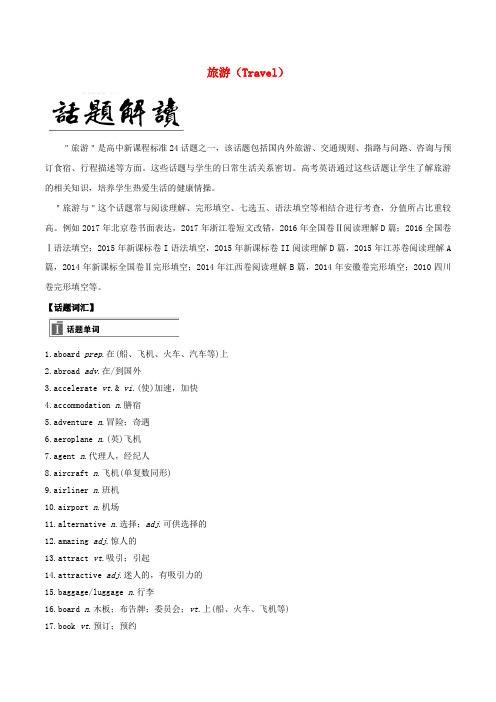
旅游(Travel)"旅游"是高中新课程标准24话题之一,该话题包括国内外旅游、交通规则、指路与问路、咨询与预订食宿、行程描述等方面。
这些话题与学生的日常生活关系密切。
高考英语通过这些话题让学生了解旅游的相关知识,培养学生热爱生活的健康情操。
"旅游与"这个话题常与阅读理解、完形填空、七选五、语法填空等相结合进行考查,分值所占比重较高。
例如2017年北京卷书面表达,2017年浙江卷短文改错,2016年全国卷Ⅱ阅读理解D篇;2016全国卷Ⅰ语法填空;2015年新课标卷I语法填空,2015年新课标卷II阅读理解D篇,2015年江苏卷阅读理解A 篇,2014年新课标全国卷Ⅱ完形填空;2014年江西卷阅读理解B篇,2014年安徽卷完形填空;2010四川卷完形填空等。
【话题词汇】1.aboard prep.在(船、飞机、火车、汽车等)上2.abroad adv.在/到国外3.accelerate vt.& vi.(使)加速,加快4.accommodation n.膳宿5.adventure n.冒险;奇遇6.aeroplane n.(英)飞机7.agent n.代理人,经纪人8.aircraft n.飞机(单复数同形)9.airliner n.班机10.airport n.机场11.alternative n.选择;adj.可供选择的12.amazing adj.惊人的13.attract vt.吸引;引起14.attractive adj.迷人的,有吸引力的15.baggage/luggage n.行李16.board n.木板;布告牌;委员会;vt.上(船、火车、飞机等)17.book vt.预订;预约18.brake n.闸;vt.& vi.刹车19.cab n.(美)出租车20.carriage n.四轮马车;(火车)客车厢21.castle n.城堡22.canal n.运河23.crowded adj.拥挤的24.delay vi.& n.拖延,延误,延迟,延期;耽搁25.destination n.目的地,终点26.disadvantage n.不利条件;弱点27.fantastic adj.(口语)极好的,美妙的,很棒的28.ferry n.渡船29.flight n.航班30.fountain n.喷泉31.guidance n.引导,指导32.guide n.向导,导游33.helicopter n.直升飞机34.impressive adj.给人印象深刻的;令人钦佩的35.insurance n.保险36.journey n.旅行;路程nd vi.着陆,登岸(陆);降落38.lorry n.(英)运货汽车,卡车39.monument n.纪念碑,纪念物40.museum n.博物馆,博物院41.obey v.遵守42.outing n.郊游,远足43.pack n.包,捆;vt.打包,包装44.palace n.宫,宫殿45.passenger n.乘客,旅客46.passport n.护照47.passerby n.过客,过路人48.pedestrian n.步行者,行人49.pilot n.飞行员50.platform n.站台51.port/harbor n.港口,码头52.pyramid n.金字塔53.queue n.行列,长队54.reception n.接待55.reserve vt.预订;保留56.route n.路线;路程57.satisfy vt.满足;使满意58.scene n.风景;景色59.scenery n.风景,景色,风光60.secure adj.安全的;有把握的,牢靠的61.sight n.情景,风景;视力62.sightseeing n.游览,观光63.sign n.符号,标记65.site n.地点;遗址66.spot n.地点;场所;vt.认出;发现67.steward n.(火车、飞机、轮船等)男服务员;男乘务员68.subway n.地铁69.suitcase n.(旅行用)小提箱,衣箱;行李箱70.temple n.庙宇,寺院71.terminal n.终点站72.tip n.& vi.(给)小费73.tour n.参观,观光,旅行74.tourism n.旅游业;观光75.tourist n.旅行者,观光者76.traveller n.旅行者77.trip n.(短途)旅行,旅程78.truck n.卡车,运货车79.underground n.地铁;adj.地下的80.vehicle n.机动车81.visa n.签证82.voyage n.航行;旅行1.a dream trip梦想之旅2.a place of interest名胜3.a summer resort避暑胜地4.a mustsee place必游之地5.appeal to对……有吸引力7.be aimed at针对;旨在8.be struck by被……迷住9.be/get stuck in被困在10.beyond description难以形容11.book a single/double room预定一个单人/双人房间12.cancel the flight取消航班13.check in登记入住14.check out结账离开15.catch one’s eye吸引某人的眼球16.contribute to引起;导致17.doubledecker train双层火车18.driving license/permit驾照19.express train特快列车20.economic class经济舱21.go aboard上船、飞机、火车、汽车等22.have a good time/have fun玩得很开心23.highspeed rail高铁24.hold up耽搁,推迟25.nonstop flight直达航班26.passenger plane客机27.put up投宿28.railway station火车站29.sailing boat帆船30.selfdriving travel自驾游32.travel agency旅行社33.travel brochure旅行指南1.As is known to us allAs is known to us all,Mount Huashan is famous for its breathtaking cliffs and its unique characteristics.正如大家所知道的,华山以它险峻的悬崖和它独一无二的特征而出名。
2016年高考英语二轮复习专题(江苏专用):语法 专题2 非谓语动词
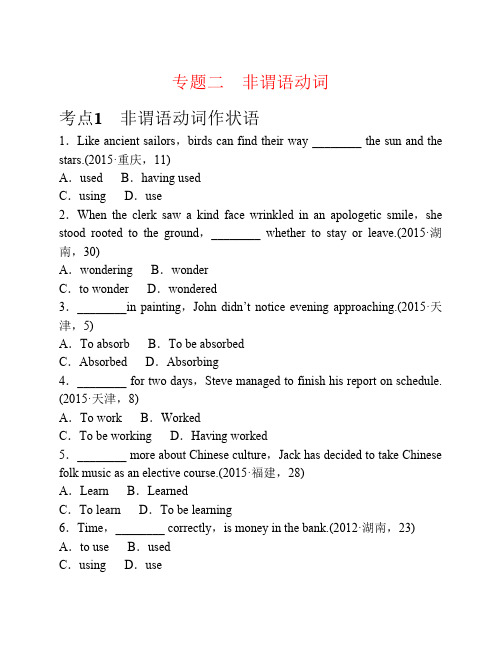
专题二 非谓语动词考点1 非谓语动词作状语1.Like ancient sailors,birds can find their way ________ the sun and the stars.(2015·重庆,11)A.used B.having usedC.using D.use2.When the clerk saw a kind face wrinkled in an apologetic smile,she stood rooted to the ground,________ whether to stay or leave.(2015·湖南,30)A.wondering B.wonderC.to wonder D.wondered3.________in painting,John didn’t notice evening approaching.(2015·天津,5)A.To absorb B.To be absorbedC.Absorbed D.Absorbing4.________ for two days,Steve managed to finish his report on schedule. (2015·天津,8)A.To work B.WorkedC.To be working D.Having worked5.________ more about Chinese culture,Jack has decided to take Chinese folk music as an elective course.(2015·福建,28)A.Learn B.LearnedC.To learn D.To be learning6.Time,________ correctly,is money in the bank.(2012·湖南,23) A.to use B.usedC.using D.use考点归纳1.分词作状语表示时间、原因、条件、结果、伴随或方式、目的、评论性状语等;现在分词表示主动,过去分词表示被动;分词的完成时表示动作先于谓语动词发生。
2016高考总复习英语语法专项训练非谓语动词

语法专项训练(九)——非谓语动词
(6)To complete the project by the end of this month is necessary.(改用形式
主语)
It is necessary to complete ____________________________the
project by the end of this month.
语法专项训练(九)——非谓语动词
They knew her very well.They had
seen her grow up from childhood.
他们很了解她, 是看着她长大的. (省
to)
The patient was made not to eat oily food after the operation. 病人术后不准吃油腻食品. (不能省to)
advise, allow, permit, ask, beg,
persuade, want, order, encourage,
force, get, invite, expect, teach, wish,
warn等.
I’ll try to get her to see the doctor.
我会尽力让她去看医生.
done.
否定形式为not to do.
不定式在句中可作主语、宾语、表 语、定语、状语和补语.
语法专项训练(九)——非谓语动词
1.作主语
To master a foreign language is
necessary.
掌握一门外语是必要的.
2.作宾语
(1)可用不定式作宾语的动词常见 的有: want, wish, agree, like, decide,
2016年高考复习高中英语语法之非谓语动词
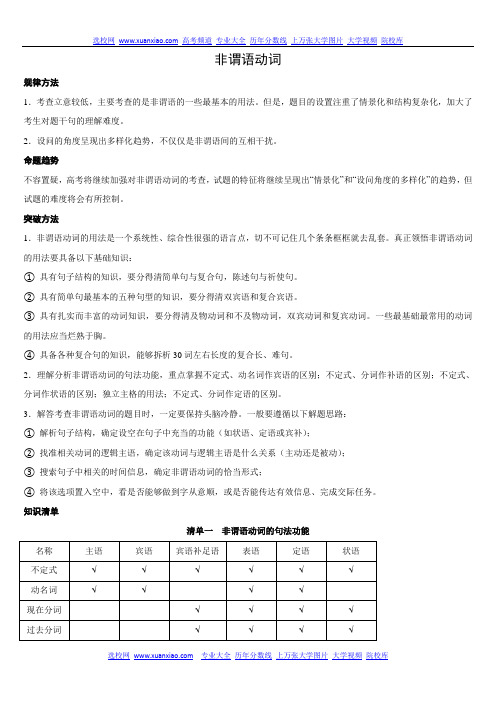
非谓语动词规律方法1.考查立意较低,主要考查的是非谓语的一些最基本的用法。
但是,题目的设置注重了情景化和结构复杂化,加大了考生对题干句的理解难度。
2.设问的角度呈现出多样化趋势,不仅仅是非谓语间的互相干扰。
命题趋势不容置疑,高考将继续加强对非谓语动词的考查,试题的特征将继续呈现出―情景化‖和―设问角度的多样化‖的趋势,但试题的难度将会有所控制。
突破方法1.非谓语动词的用法是一个系统性、综合性很强的语言点,切不可记住几个条条框框就去乱套。
真正领悟非谓语动词的用法要具备以下基础知识:①具有句子结构的知识,要分得清简单句与复合句,陈述句与祈使句。
②具有简单句最基本的五种句型的知识,要分得清双宾语和复合宾语。
③具有扎实而丰富的动词知识,要分得清及物动词和不及物动词,双宾动词和复宾动词。
一些最基础最常用的动词的用法应当烂熟于胸。
④具备各种复合句的知识,能够拆析30词左右长度的复合长、难句。
2.理解分析非谓语动词的句法功能,重点掌握不定式、动名词作宾语的区别;不定式、分词作补语的区别;不定式、分词作状语的区别;独立主格的用法;不定式、分词作定语的区别。
3.解答考查非谓语动词的题目时,一定要保持头脑冷静。
一般要遵循以下解题思路:①解析句子结构,确定设空在句子中充当的功能(如状语、定语或宾补);②找准相关动词的逻辑主语,确定该动词与逻辑主语是什么关系(主动还是被动);③搜索句子中相关的时间信息,确定非谓语动词的恰当形式;④将该选项置入空中,看是否能够做到字从意顺,或是否能传达有效信息、完成交际任务。
知识清单清单一非谓语动词的句法功能清单二分词、不定式作宾补用法要点一、分词、不定式作宾语补足语的区别1.感官动词see, watch, observe, look at, hear, listen to, notice 等和使役动词have 后面的宾补有三种形式,即原形动词(不带to 的不定式)、现在分词和过去分词。
高考英语语法复习——非谓语动词

3
非谓语动词的否定式为“ not + 非谓语动词”。
4 非谓语动词有时态和语态吗?
翻译下列句子,指出画线部分的语法术语名称 1. Bell is generally considered to_have_invented the phone.
人们一般认为贝尔发明了电话。to have invented: 动词不定式的完成式。
sleeping dog 中dog与sleeping有逻辑上的主谓关系, 即“狗睡觉”(The dog is sleeping)。sleeping 是现在分 词。
6
2. A sleeping car is expensive.
卧车是很昂贵的。a sleeping car中sleeping表示car 的用途,即“用来睡觉的车”(a car for sleeping)。 sleeping是动名词。
8 现在分词和不定式作结果状语有何区别?
翻译下列句子,指出句中画线部分充当的成分及 其含义
1. The old lady hurried to the bus station to see her son off only to_be_told_the_bus_had_left.
老太太匆匆赶到车站给儿子送行,想不到被告知 车已开走。不定式短语to be told the bus had left作结 果状语,表达出人意料或不情愿看到的结果。
9 什么是不定式和动名词的复合结构?
翻译下列句子,并指出复合结构在句中充当的成分 1. It was very cruel of_them_to_eat_rare_wild_animals. 2. I don't think it advisable for_him_to_learn_medicine. 3. This is for_you_to_decide. 4. The article is too difficult for_a_child_of_ten_to_ understand.
高考英语语法复习 动词不定式

高考英语语法--动词不定式一.故事导入Xiao Ming wants to play① cellphone games every day and his dream is to play② video games for three days and nights continuously.But he has so much homework to do③.In order to have④ a chance to play③cellphone games,Xiao Ming decides to study①hard to get④a high score.He really hopes that his father will allow him to play⑤ cellphone games every day.To obtain⑥ such a chance is not easy.二.重点分析一、不定式的形式二、核心考点1.不定式作主语(1)不定式作主语时,可以直接放在句首,谓语动词常常用单数。
To enter a good university for further study is my goal now.进入一所好大学深造是我现在的目标。
(2)不定式作主语时,更多放在谓语之后,用it作形式主语,常用于“It is/was+adj.(+for/of sb.)+to do sth.”结构中。
It’s rude to turn your back to your teacher and refuse to answer.背对着老师,拒绝回答问题是不礼貌的。
It’s necessary for us to help those in need.我们有必要帮助那些有困难的人。
2.不定式作宾语(1)不定式可在intend(打算),plan(计划),expect(期望),pretend(假装),would like/love/prefer(喜欢),wish(希望),decide(决定),agree(同意),help(帮助),manage(设法),persuade(说服),refuse(拒绝),seem/appear(好像),promise(答应),attempt(企图),choose(选择),ask(询问),learn(学习),tell(告诉),fail(失败),afford(付得起)等后作宾语。
高考英语语法专题复习:非谓语动词讲义(不定式、动名词
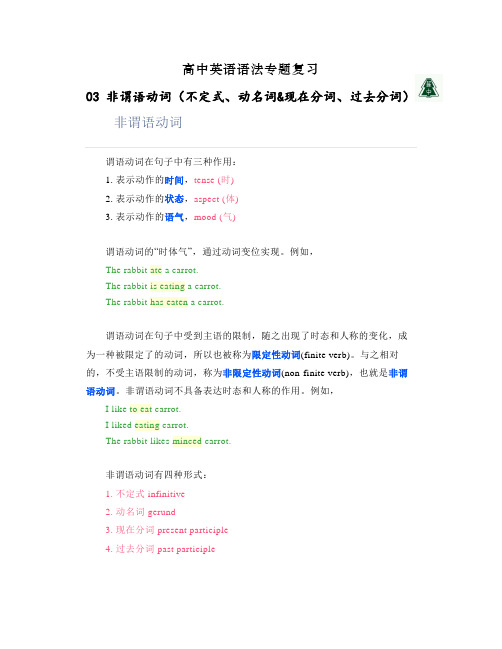
高中英语语法专题复习03 非谓语动词(不定式、动名词&现在分词、过去分词)非谓语动词谓语动词在句子中有三种作用:1. 表示动作的时间,tense (时)2. 表示动作的状态,aspect (体)3. 表示动作的语气,mood (气)谓语动词的“时体气”,通过动词变位实现。
例如,The rabbit ate a carrot.The rabbit is eating a carrot.The rabbit has eaten a carrot.谓语动词在句子中受到主语的限制,随之出现了时态和人称的变化,成为一种被限定了的动词,所以也被称为限定性动词(finite verb)。
与之相对的,不受主语限制的动词,称为非限定性动词(non-finite verb),也就是非谓语动词。
非谓语动词不具备表达时态和人称的作用。
例如,I like to eat carrot.I liked eating carrot.The rabbit likes minced carrot.非谓语动词有四种形式:1. 不定式 infinitive2. 动名词 gerund3. 现在分词 present participle4. 过去分词 past participle谓语动词是简单句的核心动词,非谓语动词只可能出现在其他的句子成分中。
1. 主语例:Swimming makes us hale and hearty.2. 宾语例:Janet suddenly stopped talking.3. 表语/主语补语例:Her wish is to become a doctor in the future.4. 宾语补语例:I invited him to come here.5. 定语例:Don't disturb the sleeping dog.6. 状语例:He went to the supermarket to buy a pen.不定式、动名词句子的核心动词只能由谓语动词充当,而非谓语动词可以充当句子的其他成分。
高考英语语法专项训练 第5讲 动词及动词短语

3. call
• • • • • • • call for call off call on call up call at call in call back 需要;要求;邀请 取消;停止 拜访(某人);看望;号召 打电话;使人想起;召集 访问(某地) 请来;召集 回电话;召回
e • come across • come along • come into effect • come on • come out
come through come to come up against come up with come back come true come about
经历;获得成功 苏醒;达到;总数为 碰到(困难) 赶上;提出 回来;反驳 变为现实 发生
6. give
• give away • give out (vi) • give off • give up • give in 赠送;颁发;泄露;告发;失去 分发;公布;公开;用完耗尽 发出;放出 放弃 屈服;投降;让步;上交;呈交
他给我带了一本好杂志。
(2)双宾语易位时需借助介词for的常用动词
book(预订),buy(购买),choose(选择),cook(煮
),draw(画),fetch(去取),find(找到),fix(安装),
get(取得,带来),make(做),order(订购), prepare(准备),save(节省),sing(唱), spare(留出 ) My father bought me a new bicycle. =My father bought a new bicycle for me.
偶遇;碰到;讲清楚 进展;成功;一道走 生效
快点;走吧;有进展 出来;结果是出版
高考英语考点精析复习讲义-非谓语动词
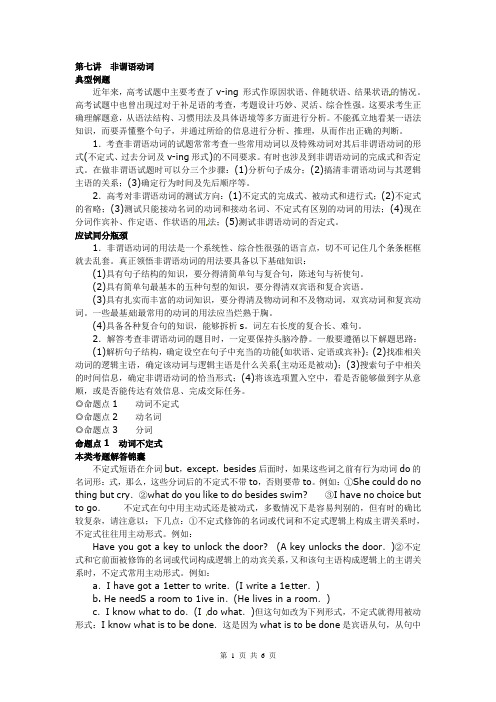
第七讲非谓语动词典型例题近年来,高考试题中主要考查了v-ing 形式作原因状语、伴随状语、结果状语的情况。
高考试题中也曾出现过对于补足语的考查,考题设计巧妙、灵活、综合性强。
这要求考生正确理解题意,从语法结构、习惯用法及具体语境等多方面进行分析。
不能孤立地看某一语法知识,而要弄懂整个句子,并通过所给的信息进行分析、推理,从而作出正确的判断。
1.考查非谓语动词的试题常常考查一些常用动词以及特殊动词对其后非谓语动词的形式(不定式、过去分词及v-ing形式)的不同要求。
有时也涉及到非谓语动词的完成式和否定式。
在做非谓语试题时可以分三个步骤:(1)分析句子成分;(2)搞清非谓语动词与其逻辑主语的关系;(3)确定行为时间及先后顺序等。
2.高考对非谓语动词的测试方向:(1)不定式的完成式、被动式和进行式;(2)不定式的省略;(3)测试只能接动名词的动词和接动名词、不定式有区别的动词的用法;(4)现在分词作宾补、作定语、作状语的用法;(5)测试非谓语动词的否定式。
应试同分瓶颈1.非谓语动词的用法是一个系统性、综合性很强的语言点,切不可记住几个条条框框就去乱套。
真正领悟非谓语动词的用法要具备以下基础知识:(1)具有句子结构的知识,要分得清简单句与复合句,陈述句与祈使句。
(2)具有简单句最基本的五种句型的知识,要分得清双宾语和复合宾语。
(3)具有扎实而丰富的动词知识,要分得清及物动词和不及物动词,双宾动词和复宾动词。
一些最基础最常用的动词的用法应当烂熟于胸。
(4)具备各种复合句的知识,能够拆析s。
词左右长度的复合长、难句。
2.解答考查非谓语动词的题目时,一定要保持头脑冷静。
一般要遵循以下解题思路:(1)解析句子结构,确定设空在句子中充当的功能(如状语、定语或宾补);(2)找准相关动词的逻辑主语,确定该动词与逻辑主语是什么关系(主动还是被动);(3)搜索句子中相关的时间信息,确定非谓语动词的恰当形式;(4)将该选项置入空中,看是否能够做到字从意顺,或是否能传达有效信息、完成交际任务。
高考英语语法非谓语动词之动词不定式

高考重点语法项目复习——非谓语动词I动词不定式一、理解并背诵下面的口诀英语句子一个主,并不并列一谓语。
再有动词怎么用,动名词分词不定式。
动名词能定主宾表,分词能表定状补。
不定式功能都具备,主表将来目的较具体。
区别不难细体悟,心中常青语法树。
二、不定式的基本形式。
主动被动一般式进行式完成式一般式完成式不定式to do to be doing to have done to be done to have been done否定式not todon not to be doing not to havedonenot to bedonenot to have beendone三、动词不定式的功能和作用。
1. 不定式可以作句子的主语、宾语、表语、定语、状语、宾语补足语或插入语。
To make a new dress takes her a lot or time.He pretended to be working hard.His ambition is to become a chemist.He is always the first to come to school.To learn English well, you must practice more..His teacher encouraged him to work harder.To be honest, I don’t agree with you.2.不定式在时间上表示将来,作状语时一般表目的,强调动作时表某一次具体的动作。
注:不定式也可作结果状语,表示意料之外的结果。
Eg. He hurried to the station, only to find the bus had gone.3.不定式作主语时,常用it做形式主语,将to do放在位于之后,使句子保持平衡。
句型1:It + 谓语+ to doeg: It takes us an hour to get there by bus.句型2:It’s + n. + to doeg: It’s our duty to help the poor.句型3:It is adj. for/of sb. to do sth.eg: It’s very kind of you to help me.It’s very difficult for him to solve the problem.四、不定式的时态和语态1. 时态: 一般式表示的动作通常与句中谓语动作同时或在其后发生We saw him go to the shop.进行式表示不定式的动作正在进行.eg: He pretended to be working hard.完成式表示不定式动作在谓语动作/状态前发生.I’m glad to have seen your mother.eg: I happened to have read the book.2.语态在下列结构中,不定式常用主动形式表示被动含义1)主语+be+adj.+to doEg. The house is comfortable to live in.常用的形容词有:easy, difficult, hard, impossible, nice, heavy, pleasant, important, interesting等。
高三英语语法专题复习 七、动词与动词短语 试题(共16页)

七、动词(dòngcí)与短语动词〔一〕知识重点归纳并记忆常见动词短语搭配和意义。
〔二〕知识呈现短语动词通常以动词为中心,通常由动词加副词或者介词构成。
英语中大量短语动词难以从字面意义上来断定其释义,很多时候应根据详细语境判断它们的意义。
有的短语动词相当于及物动词,有的那么相当于不及物动词。
1.短语动词的构成〔1〕动词+副词clear away去除掉put away收起die away消失call back回look back回忆walk back走回break down坏了calm down平静下来get down 咽下come up上来blow up爆炸turn up出现show off夸耀 give off散发take off脱下break out发生blow out吹灭run out 用完〔2〕动词+介词bring about引起 look about 环顾四周 seek for寻找burst into 闯入 turn into使变成 look into调查see to 处理 devote to奉献给 deal with处理glance at匆匆(cōngcōng)一瞥 work at干……aim at向…瞄准differ from与…不同 result from由于 insist on坚持rely on依靠 bring in引进 hope for希望得到combine with结合 lead to导致,通向 set about 着手(3) 动词+副词+介词add up to总计 keep away from不靠近look down on轻视keep up with赶上 make up for弥补 get on with 相处get close to接近 get out of逃避,防止 do away with废除do well in在…干得好 put up with忍受catch up with赶上look up to 仰望,尊敬 run out of用完 look forward togo on with 继续 get down to认真开场break away from2.短语动词使用时须注意的几点(1)在短语动词中,副词可以放在动词宾语前或者后。
高考英语语法高频动词词组搭配

高考英语中高频率动词的搭配根据现行初、高中英语教材以及同等难度的读物,对高频率动词的搭配进行分类归纳,作为高考考生复习的参考。
一、do1、do + n.do exercises做练习, 做广播操do housework干家务,do business做生意,do English puzzle猜英语字谜,do wonders创造奇迹2、do + a + n.do a room整理房间,do a favor开恩, 赏脸do a sum计算,do a show展示do a good deed 做一件好事3、do + an + n.do an experiment做实验4、do + the + n.do the problem解决问题,do the trick愚弄,5、do + one's + n.do one's lesson做功课,do one's hair梳理头发,do one's teeth刷牙,do one's bed铺床, 整理床铺do one's duty尽义务,do one's best竭力try one’s best 6、do + some + v-ingdo some washing涮洗,do some reading读书,do some shopping购物,do some sewing缝补,do some cleaning做清洁,do some sightseeing观光,do some traveling旅行,do some cooking做饭,do some studying学习,do some sweeping打扫,do some speaking发言7、do + n. + to sb.do justice to sb.对某人公正,do good to sb.对某人有好处,do harm to sb.对某人有危害,do damage to sb.对某人有损害, do honor to sb.对某人开恩,do wrong to sb.冤枉某人,do right to sb.对某人公正二、give1、give + n.give trouble作乱,give help to提供帮助,give encouragement鼓励, give permission许可,give support支持,give way让步2、give + a + n.give a description描述,give a hand帮助,give a look看一眼,give a ring打,give a push推一下,give a pull拉一下,give a welcome欢迎,give a concert举办音乐会, give a lecture演讲,give a reply回答,give a smile笑一笑3、give + an + n.give an excuse找借口,give an order订购,give an example举例4、give + sb. + n.give sb. a rise给某人涨工资, give sb. a lift搭便车三、go1、go + n.go Dutch各自付账2、go + for + n.go for a drive开车兜风,go for a swim去游泳,go for a walk散步,go for an outing远足3、go + v-inggo climbing去爬山,go cycling骑车兜风,go dancing去跳舞,go farming去务农,go fishing去钓鱼,go hunting去打猎,go hiking去远足,go riding去骑马,go skiing去滑水/雪,go skating去滑冰,go swimming去游泳,go walking散步,go shopping出去购物,go shooting去射击,go picnicking出去野炊,4、go + to + n.go to school上学,go to college上大学,go to bed上床睡觉,go to hospital看病,go to church朝拜,go to pieces破碎,go to waste浪费,go to work上班四、have1、have + n.have breakfast/lunch/supper吃早/中/晚餐, have tea喝茶,have sports从事体育运动,have patience有耐心,have fun开心,have difficulty(in doing srth.)有困难2、have + a + n.have a meal吃饭,have a drink喝饮料,have a beer喝啤酒,have a wine喝酒,have a coffee喝咖啡,have a taste品尝,have a smoke吸烟,have a discussion讨论,have a meeting开会,have a talk交谈,have a chat闲聊,have a quarrel争吵,have a break休息,have a haircut理发,have a try试一试,have a rest休息,have a lesson上课,have a class上课,have a dream做梦,have a game玩游戏,have a dance跳舞,have a stomachache肚子痛, have a toothache牙痛, have a backache背痛, have a cold感冒,have a cough咳嗽,have a fever发烧,have a holiday度假,have a day off休息一天, have a good time玩得开心, have a picnic野炊3、have + an + n.have an influence有影响, have an exam考试,have an interview面试, have an objection反对五、make1、make + n.make laws制订法规,make friends(with sb.)交友, make research研究,make progress取得进步,make great effort竭尽全力, make contribution做出贡献, make war发动战争,make peace讲和,make money挣钱,make remarks发表议论, make faces做鬼脸,make clothes缝制衣服, make profit赢利,make sense有道理,make difference有区别, make dinner做饭,make fun取乐,make preparations做准备, make bed铺床,make tea泡茶2、make + a + n.make a statement述, make a journey旅行,make a request请求,make a bargain讨价还价, make a comment发表评论, make a copy复制,make a discovery发现,make a fire生火(一堆火/一炉火), make a fortune发财,make a survey调查,make a sacrifice牺牲,make a study研究,make a guess猜测,make a call打,make a mistake犯错误,make a speech讲话,make a vote投票,make a plan制订计划,make a living谋生,make a decision做出决定,make a promise许诺,make a sentence造句,make a suggestion提议,make a comparison作比较, make a choice作出选择,make a joke开玩笑,make a reply回答,make a record计录,make a trip旅行,make a contrast对比,make a policy制订政策,make a change改变,make a point发表观点,make a sound出声3、make + an + n.make an excuse假借,make an offer提供,make an experiment做实验, make an observation观察, make an answer作答,make an attack攻击,make an attempt企图,make an investigation调查, make an explanation解释, make an arrangement安排, make an appointment约定, 约会make an invitation邀请,make an inquiry查询,make an improvement改进4、make + some + n.make some noise发出声响, make some trouble搞出麻烦make one's way艰难地行走六、keep1、keep + n.keep company和某人在一起,keep secret,keep house看家,keep silence不出声,keep watch守望,keep order维持秩序,keep balance保持平衡,keep time守时,keep cattle养牛,keep goal守门2、keep + a + n.keep a diary写日记,keep a promise信守诺言, keep a shop开商店,keep a family养家糊口3、keep + the + n.keep the rules守纪,keep the score记分,keep the law守法,keep one's appointment守信,keep one's distance避免亲近,keep one's head保持镇静,keep one's temper不发脾气,keep one's word信守诺言七、set1、set + n.set sail启航,set fire纵火,set eggs使母鸡孵蛋2、set + a + n.set a clock对钟,set a date订时间,set a trap设陷阱,set a style确立风格,set a tone定调,set a speed调速,set a price定价,set a saw调锯3、set + an + n.set an example树榜样,set an exam paper出考题set one's hair做头发,set one's watch对表,set one's face against sth.坚决反对, set one's eye on sth.看见某事,set one's teeth咬紧牙关1、take + n.take care小心,take pictures照相,take photos拍照,take notes做笔记,take advice接受劝告,take medicine吃药,take sides偏袒,take aim瞄准,take notice留意,take turns轮流,take time花时间2、take + a + n.take a rest休息,take a walk散步,take a bath洗澡,take a plane乘飞机,take a bus坐公交车,take a taxi打的,take a lift坐电梯,take a dictation听写,take a deep breath深呼吸,take a holiday度假,take a vote投票3、take + an + n.take an exam参加考试4、take + the + n.take the first place取得第一名的成绩, take the place of取代,take the chance抓住机会5、take + one's + n.take one's choice作出选择,take one's seat就座。
【步步高+北师大版】2016届高三一轮英语大一轮复习总结(语法专题word版学案):专题二-动词和动
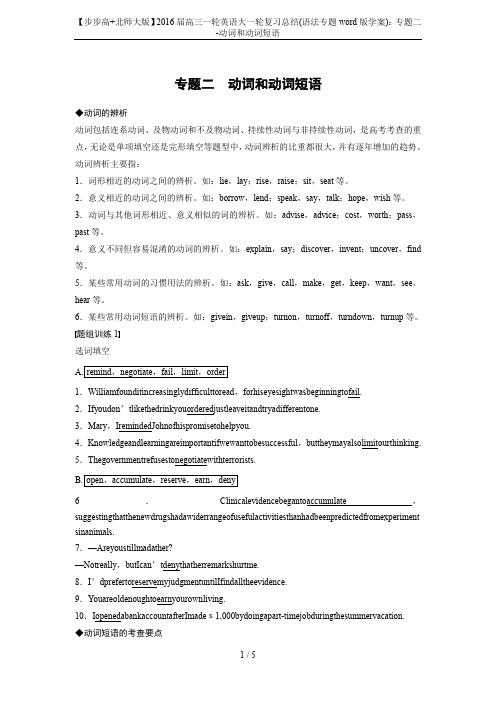
专题二动词和动词短语◆动词的辨析动词包括连系动词、及物动词和不及物动词、持续性动词与非持续性动词,是高考考查的重点,无论是单项填空还是完形填空等题型中,动词辨析的比重都很大,并有逐年增加的趋势。
动词辨析主要指:1.词形相近的动词之间的辨析。
如:lie,lay;rise,raise;sit,seat等。
2.意义相近的动词之间的辨析。
如:borrow,lend;speak,say,talk;hope,wish等。
3.动词与其他词形相近、意义相似的词的辨析。
如:advise,advice;cost,worth;pass,past等。
4.意义不同但容易混淆的动词的辨析。
如:explain,say;discover,invent;uncover,find 等。
5.某些常用动词的习惯用法的辨析。
如:ask,give,call,make,get,keep,want,see,hear等。
6.某些常用动词短语的辨析。
如:givein,giveup;turnon,turnoff,turndown,turnup等。
题组训练1选词填空A.remind,negotiate,fail,limit,order 1.Williamfounditincreasinglydifficulttoread,forhiseyesightwasbeginningtofail. 2.Ifyoudon’tlikethedrinkyouorderedjustleaveitandtryadifferentone.3.Mary,IremindedJohnofhispromisetohelpyou. 4.Knowledgeandlearningareimportantifwewanttobesuccessful,buttheymayalsolimitourthinking. 5.Thegovernmentrefusestonegotiatewithterrorists.B.open,accumulate,reserve,earn,deny 6.Clinicalevidencebegantoaccumulate,suggestingthatthenewdrugshadawiderrangeofusefulactivitiesthanhadbeenpredictedfromexperiment sinanimals.7.—Areyoustillmadather?—Notreally,butIcan’tdenythatherremarkshurtme.8.I’dprefertoreservemyjudgmentuntilIfindalltheevidence. 9.Youareoldenoughtoearnyourownliving.10.IopenedabankaccountafterImade﹩1,000bydoingapart-timejobduringthesummervacation.◆动词短语的考查要点动词短语是指动词和介词、副词或名词的习惯搭配。
高考英语语法复习---非谓语动词3
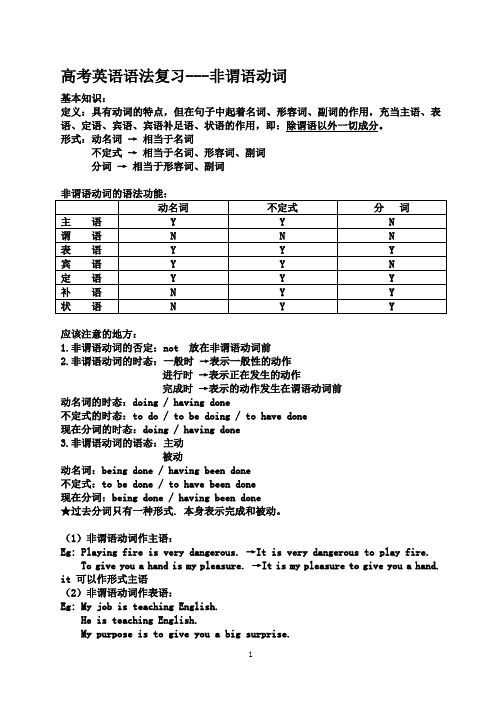
高考英语语法复习---非谓语动词基本知识:定义:具有动词的特点,但在句子中起着名词、形容词、副词的作用,充当主语、表语、定语、宾语、宾语补足语、状语的作用,即:除谓语以外一切成分。
形式:动名词→相当于名词不定式→相当于名词、形容词、副词分词→相当于形容词、副词应该注意的地方:1.非谓语动词的否定:not 放在非谓语动词前2.非谓语动词的时态:一般时→表示一般性的动作进行时→表示正在发生的动作完成时→表示的动作发生在谓语动词前动名词的时态:doing / having done不定式的时态:to do / to be doing / to have done现在分词的时态:doing / having done3.非谓语动词的语态:主动被动动名词:being done / having been done不定式:to be done / to have been done现在分词:being done / having been done★过去分词只有一种形式. 本身表示完成和被动。
(1)非谓语动词作主语:Eg: Playing fire is very dangerous. →It is very dangerous to play fire.To give you a hand is my pleasure. →It is my pleasure to give you a hand. it 可以作形式主语(2)非谓语动词作表语:Eg: My job is teaching English.He is teaching English.My purpose is to give you a big surprise.The house is burnt down.Teaching English is my job.(3)非谓语动词作宾语:Eg: I want to become a doctor.He enjoyed living in the countryside.★只能跟动名词作宾语的动词和动词短语:mind, miss, excuse, enjoy, escape consider, admit, advise, appreciate, enjoy, avoid, finish, practise, suggest, delay, imagine, quit, resist,risk, stand, bear …be used to, look forward to, stick to, lead to,object to, pay attention to, see to, set about,get down to, feel like, be devoted to…★只能跟不定式作宾语的动词:refuse, demand, hope, agree(4)非谓语动词作定语:Eg:the waiting room/ the waiting carthe students attending the meetingthe people invited to the partythe last one to arrivethe letter to be postedthe posted letter动名词表示所修饰名词的功能和用途现在分词和所修饰名词之间是主动关系过去分词和所修饰名词之间是被动关系,表动作完成不定式表示一个尚未发生的动作(5)非谓语动词作补语:Eg: I want you to help me.He rushed away, leaving me standing here shocked.I tried to make myself understood.With so much work to do, I dear not waste any minute.不定式表示尚未发生的动作现在分词表示和宾语之间是主动关系过去分词表示和宾语之间是被动关系(6)非谓语动词作状语:Eg: I got up early to catch the bus.Living in the village, he enjoyed the fresh air.Praised by the teacher, he was proud of his progress made in study. 不定式表示目的或者是出乎意料的结果现在分词表示和句子的主语之间是主动关系过去分词表示和句子的主语之间是被动关系分词作状语,可以表示原因,伴随,方式等等(7)动名词的复合结构:Eg: Do you mind my/me opening the door?Can you imagine his/him becoming a star?The mistake led to our/us ending up in failure.★动名词的复合结构,表示的是动名词动作的发出者即:它的逻辑主语。
- 1、下载文档前请自行甄别文档内容的完整性,平台不提供额外的编辑、内容补充、找答案等附加服务。
- 2、"仅部分预览"的文档,不可在线预览部分如存在完整性等问题,可反馈申请退款(可完整预览的文档不适用该条件!)。
- 3、如文档侵犯您的权益,请联系客服反馈,我们会尽快为您处理(人工客服工作时间:9:00-18:30)。
2016高考英语语法复习之旅谓语动词与非谓语动词谓语动词 ( 2*8 )1. John ___________(dismiss) last week because of his casual attitude towards his job.2. He____________(take) a walk leisurely by the lake when he heard someone shouting for help.3. It is four months since my brother ___________(join) the army.4. this is the most boring concert I _____________(attend).5. we shall go outing as long as it ________(not rain) this afternoon.6. Mary went to the box office at lunch time, but all the tickets _________(sell) out.7. All the tickets _______(sell) out by the time Mary went to the box office .8. ----Do you know if Terry will go camping this weekend? ----Terry? Never! She _____tents and fresh air.A. has hatedB. hatedC. will hateD. hates非谓语动词 (5+4+1)I. 非谓语动词作主语1. ________ (smoke) is harmful to people ’s health.2. _________ (expose) to sunlight for too much time will do harm to one ’s skin.3. She is never willing to alter any of his opinions. It ’s no use _______ with him. (argue)4. In fact it is a hard job for the police ______ (keep) order in an important football match.It ’s a waste of time doingThere is no point _________________. Have no difficulty ____________ There is no need ____________ spend time in doingwaste time ___________II. 非谓语动词作宾语1. Bill suggested _______ (hold) a meeting on what to do for the Shanghai expo during the vacation. this annual plan can ’t be carried out without _________ (approve)mind, miss, mention, escape, imagine, consider, permit, postpone, avoid, admit, allow, advise, appreciate, feel like, forbid, delay, deny, risk, resist, recommend , 介词 + doingdevote …to, be accustomed to, object to, stick to, be opposed to, contribute to, stick to + doingThe discovery of new evidence led to the thief ____________ (catch).Victor apologized for his _________ (not able) to inform me of the change in the plan.2. And now comes evidence showing that 11-year-old children are six times more likely _________ (send) a text when the injury happened.demand, intend, attempt, desire, make up one ’s mind to, expect, promise, agree, manage, fail, happen, seem, pretend, refuse, afford, be likely to + to do3. I still remember ___________ (take) to the Famen Temple and what I saw there.Remember, forget, regret, go on, stop, mean, try, + doing, to do4. As a result of the serious flood, two-thirds of the buildings in the area need _________. (repair) require, want, deserve, be worth + doingIt is said in Australia there is more land than the government knows what _______ (do) with it. Sandy could do nothing but ________ to his teacher that he was wrong. (admit)5. I admire the astronauts for their ability __________ (adjust) themselves to the different spaceenvironment so soon.III. 非谓语动词作表语This cartoon is _________(amuse)The audience are ______at the cartoon. (amuse)The pilot asked all the passengers to remain ___________ (seat) as the plane was landing.IV. 非谓语动词作定语1. From her __________voice (excite) , we know he has heard the ___________ news. (excite)2. The ancient building ___________(repair)at present is a valuable historical site left by our ancestors. The ancient tower __________ (build) in Ming Dynasty has endured the test of time, standing there like a great hero.Their silver wedding anniversary __________ (announce) soon will be held in the grand hotel.3. the flowers __________ (smell) sweet in the botanic garden attract the visitors to the beauty of nature.4. 1) the Browns have a comfortable house __________ (live) in.2) Please give me a knife _________ (cut) _________.3) I have some questions ______________ (ask)4) ------ Can I help you?------ Yes, I have a leather coat _____________ (polish). How much will you charge?5) Who ________ (blame) for the animal extinction?6) This air-conditioned bus is comfortable to _________ (ride).7) China has become the third country ___________ (softland) unmanned spacecraft on the moon.V. 非谓语动词做状语1. ________ (ensure) the safety of gas, the government has checked the city’s gas supply systemthoroughly.2. In order __________ (adapt) himself to the new training environment, this athlete bought a localmap to get familiar with the places there.I rushed to the school, only __________ (tell) that the class was cancelled.3. I stood there, _________ (read) the advertisement in the newpaper.4. __________ (see) the teacher entering the room, the students stood up.5. ___________ (arrange) the accommodation of the tourists, the guide got into his own room to havea rest.6. __________________ (stared) at by the audience, this actress felt so nervous as not to speak aword.7. Though ________(arrest) for adequate evidence, this suspect refused to confess to the police thecrime he committed.Once ___________ (acquire), the knowledge will accompany you all your life.While _________ (live) abroad, he picked up a local accent, and broadened his horizon.VI. 非谓语动词作宾语补足语1. The artist advised the child _________ (follow) the examples of the masters of the past.2. The child was warned ___________ (not play ) fire for fun, and she should keep alert to thedanger.3. the missing boy was last seen _________ (play) near the East Lake.4. I will have Bob ________ (show) you to your room.The shop manager will have the shop _________ (decorate) with the artificial flowers, which appear to be true.Never does the X-ray technician keep the patients ___________ too long. (wait)5. The thief was caught __________ (steal) the bicycle, and he had to admitted it.6. With the flag ________ (rise) slowly, we sang the national anthem seriously.With a wedding anniversary _____________ (attend), he can’t spare any time to do sports.With the homework __________ (assign), the teacher left the class ________ (do) their work on their own.Exer.1. 台风常常会给当地的居民造成巨大的损失。
